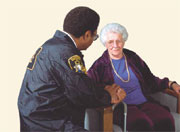
Elder Abuse
- The United States Census Bureau projected in 2000 that California's elderly population will have doubled by 2025 to 6.4 million - a larger growth rate than any other state.
- The California Department of Finance projects that the number of California residents aged 65 and older--those who are most likely to need nursing homes or other long term care--will nearly double between 2010 and 2030.1
- About 110,000 Californians live in about 1,300 licensed nursing homes 2 and about 150,000 live in about 7,500 licensed residential care facilities for the elderly.3 Another 150,000 or more Californians are estimated to live in unlicensed assisted living facilities that may or may not be able to care for them properly.4
- Many residents of both licensed and unlicensed facilities suffer from dementia and may be given dangerous antipsychotic drugs to sedate or restrain them improperly.
- In 2009 the California Senate Office of Oversight and Outcomes reported that 13% of all complaints to the California Office of the State Long Term Care Ombudsman involved abuse, gross neglect, or exploitation, over twice the national rate of 5%.5
Together, these staggering statistics and projections illustrate the urgent need to address and remedy the poor quality of care in many of California's skilled nursing facilities.

Prosecuting Medi-Cal Fraud and Elder Abuse
The Division is composed of three units designed to prosecute those who abuse California's elderly and dependent population and the Medi-Cal Program.
Criminal Law Unit
The Criminal Law Unit investigates and prosecutes crimes against elders and dependent adults committed by employees in care facilities. These crimes include physical abuse, homicide, sexual assault, false imprisonment, assault and battery. The Criminal Law Unit also investigates and prosecutes financial abuse against elder and dependent adults as well as fraud by Medi-Cal providers.
Civil Law Unit
The Civil Law Unit investigates and prosecutes fraud by Medi-Cal providers, at both a state and national level. The Civil Law Unit frequently works with other federal and other state prosecutors to combat fraud on the Medicaid system using the California False Claims Act and other civil enforcement statutes.
Facilities Enforcement Team
The Facilities Enforcement Team investigates and prosecutes owners and operators of facilities, such as skilled nursing homes, hospitals, and residential care facilities for the elderly, for adopting policies and/or promoting practices that lead to neglect and poor quality of care. These prosecutions frequently include the prosecution of corporate entities who facilities engage in institutional neglect or substandard care.
The Facilities Enforcement Team also oversees the Operation Guardians Program. The primary goal of the Operation Guardians program is to help protect California's elder and dependent adult residents residing in approximately 1,300 skilled nursing facilities statewide. The Operation Guardians team identifies instances of potential criminal abuse or neglect for further investigation and possible prosecution.
1California Controller, http://www.sco.ca.gov/state_finances_101_california_population.html, U:\Shared.dir\FET\Users\DicaV\Research\Misc\2015-08-06 CA Controller 65 and over.pdf.
2California Department of Public Health, https://hfcis.cdph.ca.gov/aboutUs.aspx, U:\Shared.dir\FET\Users\DicaV\Research\Misc\2015-08-06 DPH Nursing Home Stats.pdf (126,800 nursing home beds in California); California Association of Health Facilities, http://www.cahf.org/MediaCenter/FactsandStatistics.aspx (occupancy rates in California are approximately 87 percent).
3Residential Care in California: Unsafe, Unregulated & Unaccountable (2013), California Advocates for Nursing Home Reform, p. 3; California Healthcare Foundation, A Primer on Residential Care Facilties for the Elderly (2002), p. 9 (average vacancy rate 8%).
4California Healthcare Foundation, A Primer on Residential Care Facilties for the Elderly (2002), p. 5.
5California Senate Office of Oversight and Outcomes, California's Elder Abuse Investigators: Ombudsmen Shackled by Conflicting Laws and Duties, November 3, 2009, p. 7.